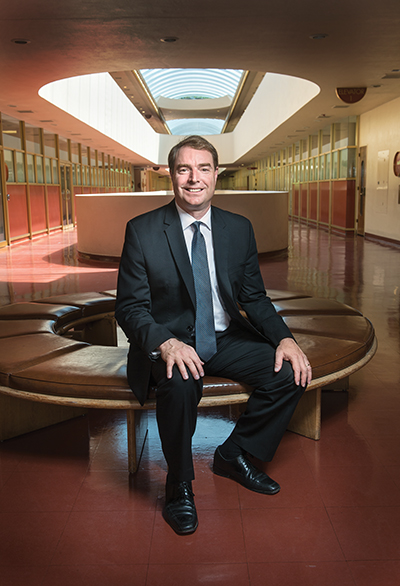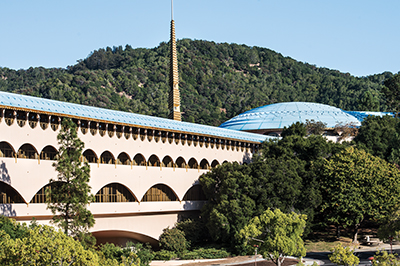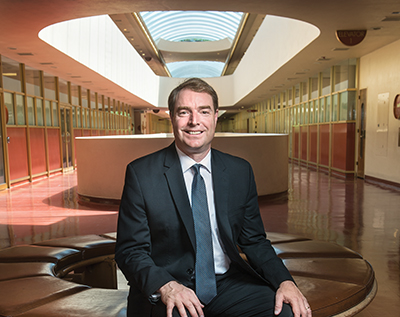
IN TODAY’S POLITICAL world, it’s rare when a challenger defeats an incumbent. But this June, that’s exactly what Damon Connolly did by ousting Susan Adams, a 12-year member of the Marin County Board of Supervisors. And he did it by capturing an impressive 60 percent of the vote in Marin County’s District One, which consists primarily of San Rafael, Santa Venetia, Lucas Valley and Marinwood.
For Connolly, 51, a practicing attorney who’s long aspired to and lived a life of public service, the win means he’ll now devote almost all his waking hours to serving the community — and get paid for it (county supervisors earn about $107,000 a year plus benefits). No stranger to civic engagement, Connolly spent seven years on the San Rafael City Council (two years as vice mayor) and is current chair of the Marin Clean Energy board, where he was a founding director.
Connolly met his wife, Dawn, while attending UC Berkeley School of Law and went on to serve as a California supervising deputy attorney general before opening his own private law practice and becoming a professional mediator. The couple, who live in Terra Linda, have two daughters: Brette, a junior at NYU, and Darin, an incoming freshman at California College of the Arts in Oakland.
Let’s start with family. You’ve been so involved with community service, it might surprise many readers that you have a family. How are things at home? Ahh, well, there’s no question that a schedule like mine puts a strain on a family — but I think we’ve handled it well and, overall, it’s been rewarding. Normally, I probably work a 70-hour week, and during the campaign it was even longer. But my wife, Dawn, knew whom she was marrying, and now our family has really been behind my community involvement. Dawn works hard with a family law practice here in Marin, so we’re both busy people. Yet over the years, it’s been gratifying; we’ve all managed to function quite smoothly together. And, knock on wood, our daughters have turned out fine. Although neither one appears interested in pursuing a career in law or politics, I think their exposure to both has been positive. The girls grew up walking door to door (lots of laughter) and, even though they didn’t like it at the time (more laughter), I think they now realize it’s been for the good. And during the recent campaign, Brette, our oldest daughter, came home from NYU to work on the phone bank and she was really good at it, so that was fun. And now, with Darin off to college, we’ve suddenly become empty nesters. And that’s going to bring changes to our family dynamic; so, overall, I think my involvement with the community has all been for the good.
Where does this drive to serve the community originate? I really credit my grandparents for inspiring me to pursue a career in public service. My grandfather was appointed postmaster of San Lorenzo by President John F. Kennedy, and that got me started; my grandfather was a great example for me.
As for the recent supervisorial campaign, what in your opinion contributed the most to your rather significant victory? In Marin, the school’s constituency is huge and I tapped into that with my four years on the Dixie school board. Also, neighborhoods are important and I had support from that group of voters after serving seven years on the San Rafael City Council. And in 2007, before coming on the city council, I’d developed good relations with its existing members and Mayor Al Boro, so I was able to come in and shake things up in a positive way. And even before any of this, while working in the attorney general’s office, I was very involved with energy matters. So in 2008, I was asked to be a founding board member of the Marin Clean Energy Authority and have been its longest-serving member as well as its chairman following the untimely death of MCE’s original chairman, Charles McGlashan. So I’ve had experience with a number of Marin’s varied communities, and a lot of them came together in my recent campaign for county supervisor. Another key to my election was getting endorsements from respected Marin political leaders of the past as well as present. People like Marin Congressman Jared Huffman and San Rafael Mayor Gary Phillips, both now in office, and former Marin County Supervisor Gary Giacomini and retired State Assemblyman Bill Bagley, and there were dozens more. It all contributed to a successful campaign; it was all very gratifying.
Your stance opposing high-density housing during the campaign seems to many to be in opposition to your pre-campaign  rhetoric — was it? If you look at my record on the San Rafael council, I think you’ll find I’ve been fairly consistent in relation to housing and high density. In Marin, there is a strong ethos of environmental protection and, shall we say, (long pause) a desire to make sure there is not overdevelopment in the community. So the Priority Development Area debate in San Rafael was where all of these issues came to the fore. We all recognized we have to provide a range of housing to people so that they can live in the community and, ideally, live close to where they work. By the same token, we were very concerned about making sure that existing neighborhoods were preserved. At the Civic Center SMART station, we decided, the people’s concerns over high density were legitimate, so we voted against a high-density designation. And instead, with a tremendous amount of community input, we came up with a station area plan with some mixed use and involving better circulation. So, it’s not like nothing will be built there; it’s just that what will be built there will be more compatible with the existing zoning. Now, the downtown SMART station is still a Priority Development Area, and I think there the city has done a good job with infill housing, and there is, relatively speaking, some more density. Also, there is talk of a significant seniors’ project at Whistlestop near the SMART station that I believe will get support, and I think that’s good.
rhetoric — was it? If you look at my record on the San Rafael council, I think you’ll find I’ve been fairly consistent in relation to housing and high density. In Marin, there is a strong ethos of environmental protection and, shall we say, (long pause) a desire to make sure there is not overdevelopment in the community. So the Priority Development Area debate in San Rafael was where all of these issues came to the fore. We all recognized we have to provide a range of housing to people so that they can live in the community and, ideally, live close to where they work. By the same token, we were very concerned about making sure that existing neighborhoods were preserved. At the Civic Center SMART station, we decided, the people’s concerns over high density were legitimate, so we voted against a high-density designation. And instead, with a tremendous amount of community input, we came up with a station area plan with some mixed use and involving better circulation. So, it’s not like nothing will be built there; it’s just that what will be built there will be more compatible with the existing zoning. Now, the downtown SMART station is still a Priority Development Area, and I think there the city has done a good job with infill housing, and there is, relatively speaking, some more density. Also, there is talk of a significant seniors’ project at Whistlestop near the SMART station that I believe will get support, and I think that’s good.
Do you think SMART, the Sonoma-Marin Area Rail Transit, will be successful? I’m for SMART; I think it will be a viable transit option and we have to keep it fiscally in line. But I don’t think that in voting for it, the citizens of Marin intended it to be a means for overdeveloping the community.
Do you have concerns about the Association of Bay Area Governments, or ABAG? And the Metropolitan Transit Commission, or MTC? If so, what kinds of concerns are they? I think the one-size-fits-all approach that was being advocated by virtue of how the Priority Development Areas, or PDAs, were being presented to the communities raised a lot of legitimate questions. And the more we delved into it, the more we saw there were uncertainties that weren’t being answered to our satisfaction about what really was the intent. There again, it is very important for residents of Marin to feel that they — through their elected representatives — are the ones making the local planning decisions.
When you take office in January 2015, what will be your top priorities? In addition to transportation and environmental issues, during the campaign I committed to reforming the Community Services Fund process. We really need to make county finances transparent and aboveboard. So I opposed the Community Services Fund, which the Marin County Grand Jury said was operating akin to a “slush fund.” Look, there are a lot of worthwhile projects out there, so let me know about them, let’s build the coalition you’ll need and let’s evaluate them through the ordinary budgetary process. So I’m dedicated to reforming it.
Wasn’t Marinwood Plaza a contentious topic during the campaign, and won’t that be a top priority? Definitely, everyone agrees something has to be done there. It is a dilapidated shopping center, although there is a nice market there now. Based on community input during the campaign I think we should hit the reset button on the current proposed plan. The surrounding neighborhoods engaged in a vision process in the mid-2000s that provides a benchmark. That vision called for more of a retail emphasis and being sure there’s a community gathering place. Other issues are the overall scale of the project and environmental impacts, including that there’s now a state order that it be cleaned up. Finally, legitimate concerns were being raised about the impact of the project on local school finances. Those are issues I want to work through with the community and I’m looking forward to getting started.


